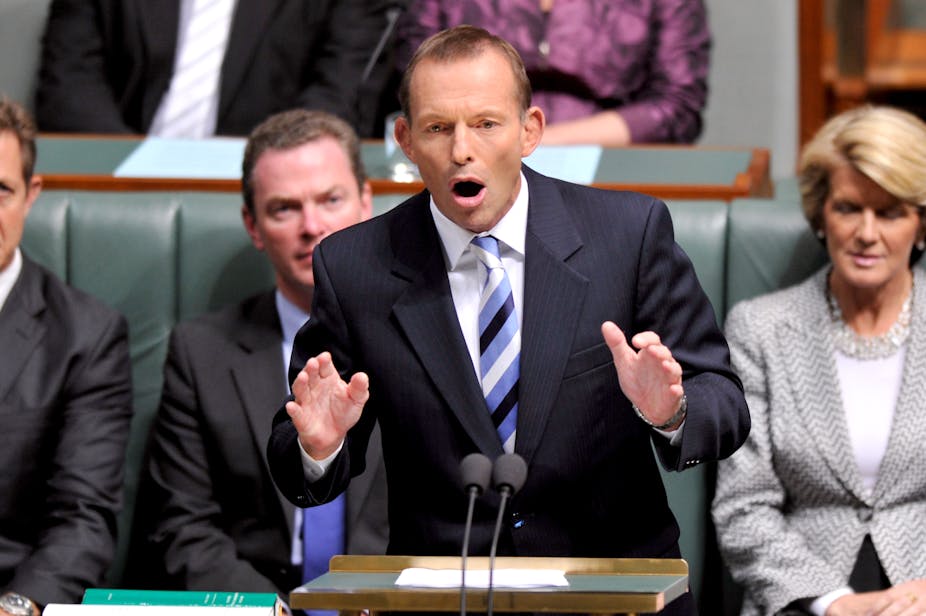Tony Abbott has arguably outlined the most important public policy agenda for the next decade (no matter which side of politics forms government over that period).
The major questions will now be: who will implement this ambitious agenda, how quickly will they attempt it, and with what compassion or compensation will it be undertaken?
His Right of Reply address was aimed at changing three things: the incentive structures guiding current public policy; changing the dependency rations as Australia undergoes demographic change and significant ageing; and tackling the structural deficit not just over the next couple of years but over the real long-term (addressing the compounding over-spending to which we are annually committed unless we reform and rebalance the “program logics”).
Its main principles are:
• Breakneck economic growth with few impediments; no carbon tax harmful to the economy or family hip-pockets; larger budget surpluses; and lower taxes (or no more new taxes).
• “Tough love” social welfare – with mandatory work for those on the dole who are able to work (or they lose the dole). But also there will be direct payments (bribes) for those longer term unemployed who take regional jobs or undertake to find work and stay off welfare. It also includes withdrawing the dole for those long-term unemployed who do not chose to work in areas where there are unskilled job vacancies.
• Central funding of all health and education provisions (school, hospitals, clinics) but ‘governed’ by local largely autonomous boards and local management. (This would also break the debilitating influence of professional public sector mass unions).
• Move incrementally on broadband and use the committed funds for more worthwhile projects of more social value (roads, rail, teaching hospitals).
• Stronger emphasis on direct action on environmental protection and sustainability, including mitigation, transformative carbon reduction schemes, green armies, re-aforestation.
• A tougher stance on border protection, on people smuggling and on the dubious practice of asylum seeking by economic transients directed only toward affluent nations.
It is an alternate vision rather than an alternative budget, with some of its origins traced back to the latter years of the Howard era.
But some measures are a repudiation of the Howard tolerance to middle-class welfare and generational welfare dependency.
It is a much more radical program than Labor’s, but then the Coalition is speaking from opposition.
Tony Abbott is going to cop some political stick from Labor for not outlining his alternative strategies for balancing the budget – what cut-back measures he would take to rein-in spending and/or increase taxes (which he studiously failed to mention).
He began with a populist pitch – “forgotten families” tightening their belts, the likelihood of a interest rate hike (when only about one-third of households are paying mortgages for their own residence), excessive government waste and no value for the tax dollar; and a future prospect of new and increased tax leading to higher costs of living for working families.
He promised to oppose both carbon taxes and mining taxes, and to repeal them if passed when the Coalition next formed government.
He stressed the “forgotten families”, and this will get most of the political and media attention over the next few weeks.
But this was not his main message and was largely a throw-away line to help mount his more ambitious agenda.
Other Opposition leaders have used the Reply speech to project their own sides’ policies or to outline an alternative fiscal and policy strategy.
I well remember Simon Crean around 2002 delivering one of the best Opposition Reply speeches against a Coalition budget, meeting the perplexed response from John Howard and Peter Costello who were miffed that Crean had not addressed “their” budget.
Abbott has done to them what they did to his side on occasions. And to follow the grim faces of the government front-bench many of them recognised his cunning strategy.
While Tony Abbott looked confident and injected some twists of humour, perhaps his single most obvious “over-the-top mistake” was to demand Julia Gillard go to an early election ostensibly because she had no mandate to govern.
This ended his speech in character, as the hard political “hit-man” who will stop at nothing. It’s Malcolm Fraser as Opposition Leader all over again – and the stains that “usurpation” placed on the national polity lasted almost two decades.
In calling for a new “people’s verdict” he is asking the present parliament to either implode or for the Coalition to become obstructionist even to the extent of blocking supply again.
His political adversarialism risks undercutting his important policy messages to which both sides will have to respond.

